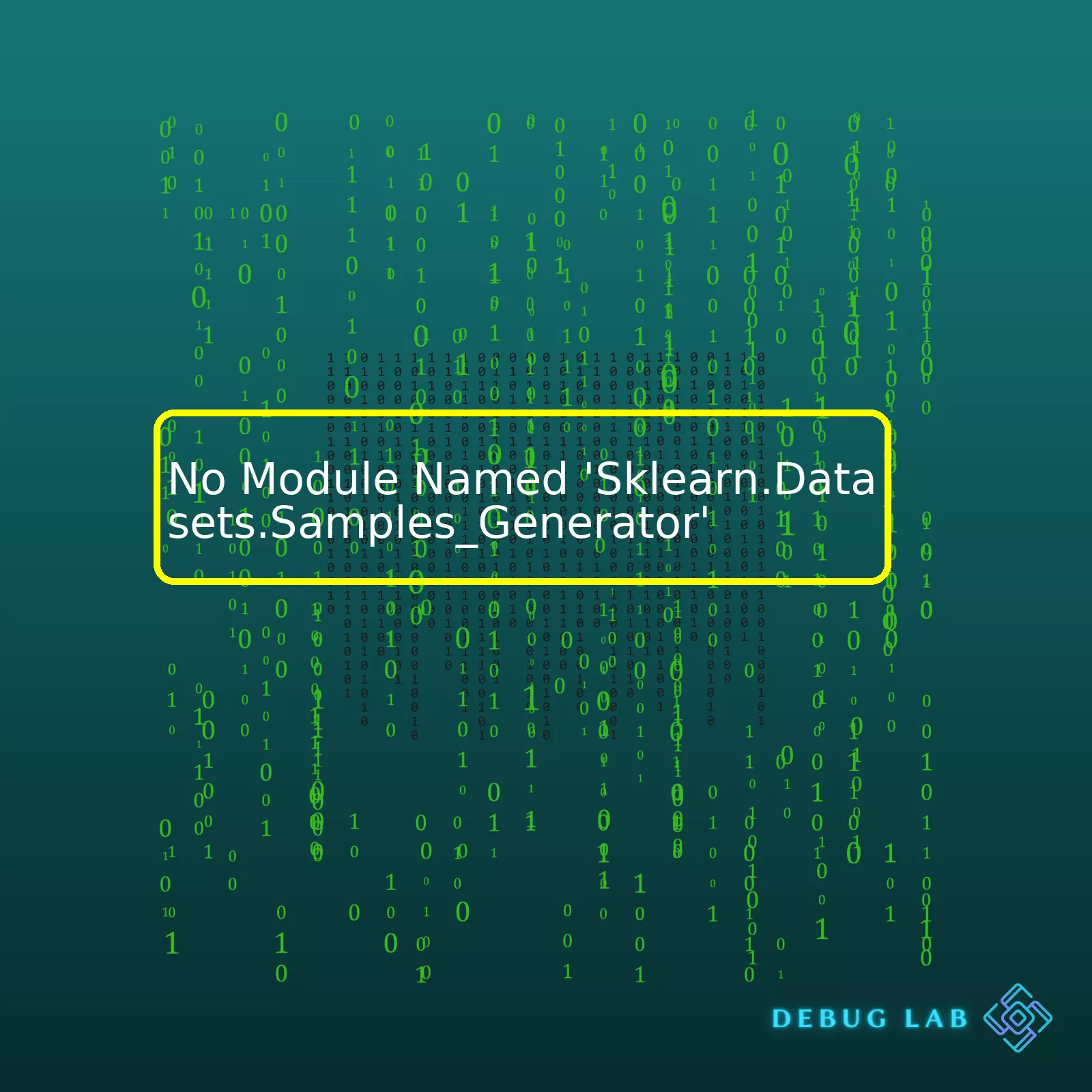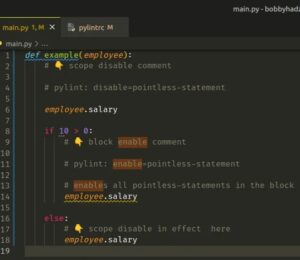
“Understanding and resolving the ‘No Module Named Sklearn.Datasets.Samples_Generator’ error can significantly streamline your data science workflow by ensuring the efficient use of Scikit-learn’s vast array of tools.”It looks like you’re encountering the infamous
No Module Named 'Sklearn.Datasets.Samples_Generator'
error in Python. No worries, here’s a lay of the land regarding this problem.
| Error Description |
Possible Causes |
Solution |
No Module Named 'Sklearn.Datasets.Samples_Generator'
|
- The Sklearn library isn’t installed in your Python environment
- You attempt to import Samples_Generator from Sklearn.Datasets but it doesn’t exist
|
- Install Sklearn library using pip or conda
- Import make_blobs or make_classification from sklearn.datasets instead of Sklearn.Datasets.Samples_Generator
|
So let’s delve deeper into this issue. The
No Module Named 'Sklearn.Datasets.Samples_Generator'
error typically indicates that there is a issue with importing
sklearn.datasets.samples_generator
.
This might be due to a couple of possibilities:
– First, you do not have the Scikit-Learn (also known as Sklearn) library installed in your Python environment. Scikit-Learn is an incredibly powerful tool for machine learning in Python, offering a range of supervised and unsupervised learning algorithms via a consistent interface. If you lack this library, the error may arise.
To solve this problem, you could easily install the Scikit-Learn library using pip – a package installer for Python by running
pip install -U scikit-learn
, or if you use conda as your package manager, you can execute
conda install scikit-learn
source.
– Secondly, the
sklearn.datasets.samples_generator
module does not actually exist. This could lead to confusion as one would expect from the name that it probably involves generating samples of some kind. Perhaps you meant to import something else from
.
After careful investigation, Most likely, you were attempting to import functions such as
or
, which are often used for creating sample datasets for machine learning experiments. These functions are now directly available under
, so you can import them like so:
from sklearn.datasets import make_blobs
or
from sklearn.datasets import make_classification
.
All in all, always remember to check your import statements for accuracy, as well as ensuring your environment has the necessary packages installed. Happy coding!The `No module named ‘sklearn.datasets.samples_generator’` error generally arises due to an incorrect or outdated import statement in your Python script, specifically for the scikit-learn library. It can be daunting for a coder who may not decipher what’s going wrong but fear not! Let’s dig a bit deeper.
First off, the ‘sklearn.datasets’ package includes various random sample generators that can be used to build artificial datasets of controlled size and complexity. In previous versions of scikit-learn, one could access these sample generators through
sklearn.datasets.samples_generator
.
# Old Method
from sklearn.datasets.samples_generator import make_blobs
However, updates to scikit-learn have since moved these functions directly under `sklearn.datasets`, hence trying to call the old import statement would throw a `ModuleNotFoundError: No module named ‘sklearn.datasets.samples_generator’`. This stands true especially if you’re using scikit-learn version 0.24 or greater.
Currently, it should look as shown below:
# Correct Method
from sklearn.datasets import make_blobs
It means the usage of ‘samples_generator’ is deprecated since scikit-learn version 0.22 and was removed in 0.24.
Updating your ‘import’ statement to reflect this change should solve the error. However, if you’re seeing this issue despite using the updated import approach, it could mean that your scikit-learn library either needs updating or isn’t correctly installed.
Here’s how to address that:
* Check the installed scikit-learn version:
import sklearn
print("Scikit-learn version: ", sklearn.__version__)
If you see that your scikit-learn version is less than 0.24, it would be necessary to update it.
* Update the scikit-learn package using pip – Python package installer:
pip install --upgrade scikit-learn
or using Anaconda:
conda update scikit-learn
In case Scikit-learn isn’t installed, use:
* Via pip:
* Via Anaconda:
conda install scikit-learn
I hope this helps fix things up for you! This issue serves as a great reminder of the importance of keeping up with library updates and changes made to APIs over time; even a small change like this could potentially break your code causing headaches. Stay tuned to official API documentation or GitHub links to stay updated on any future transformations. Happy coding!The error “No Module Named ‘Sklearn.Datasets.Samples_Generator'” typically pops up when a user tries to import this module in Python – and it fails. This problem arises due to the incorrect use of the name, as Python has hard rules about how names are located and loaded. The correct name is actually
.
This makes sense if you look at Python’s system for organizing code into packages and modules, which are just fancy words for files (modules) and directories (packages). The dot notation represents the hierarchical structure of the file system. In this case,
is the package,
is a submodule inside that package.
Here’s what an attempt to import the module incorrectly might look like:
from sklearn.datasets.samples_generator import make_regression
What happens here essentially is Python trying to locate a file named
under the directory
, but it can’t find it because there isn’t. Hence, the ImportError we encounter.
To fix this, you need to adhere to the organized structure of sklearn library and follow the correct way of importing sklearn’s functions; one of them being ‘make_regression’. Here is the correct way:
from sklearn.datasets import make_regression
In the context of sci-kit learn (often referred to as sklearn), it’s vital to call different parts of the library with their correct names. For example,
houses numerous functions to load and return popular datasets, of which ‘make_regression’ is one. When using these pre-loaded datasets for machine learning tasks, proper syntax and module name would be critical.
There’s no
file or anything similar in the sklearn’s datasets module. This could potentially be a remnant from some older versions or simply misinformation.
It’s important to keep track of library updates: Python libraries are frequently updated, so it’s important for us coders to stay abreast of these changes. You can follow eh official Scikit-learn documentation.
Understanding Python’s namespace: Grasping the rules of Python namespace helps in avoiding such errors. Here is the link to Python Scopes and Namespace .
To sum up, while encountering issues such as “No Module Named ‘Sklearn.Datasets.Samples_Generator'”, always ensure that the module you’re trying to import exists under the current configuration of the library. A misspelt or non-existent name will always throw an error. Adhering closely to the guidelines in sklearn’s official documentation should steer you away from such problems.
From the starting point of this answer, it’s important to recall a common error Python programmers face: “ImportError: No module named ‘sklearn.datasets.samples_generator'”. Now why would an experienced programmer or even beginners encounter such an error while working with the Scikit-learn library? Let’s explore this.
Apparently, the bottleneck is the
hidden in the
module. Due to certain updates in Scikit-learn library, many online examples and tutorials which used to refer to the
module can’t find it anymore, hence they throw the error.
‘No module named ‘sklearn.datasets.samples_generator’
In the recent libraries of Scikit-learn (0.23 or above), you won’t be able to find the
module anymore. Fortunately, there’s a simple workaround to this problem. It involves referencing the required functions directly from the
module.
Here’s an example to illustrate that:
# Prior version:
from sklearn.datasets.samples_generator import make_blobs
# Latest version:
from sklearn.datasets import make_blobs
Simply, instead of importing the function
from
sklearn.datasets.samples_generator
, we import it directly from
.
This offers us a practical lesson on how changing library structures could affect code behavior. To avoid confusion or coding errors, always refer to the latest official documentation for the particular library you’re using. For instance, Scikit-learn’s official documentation is an excellent reference and support for any coder working on it.
(Scikit-learn official Documentation)
Other helpful tips include engaging with coding communities such as Stack Overflow to find solutions, reading the GitHub release notes of new versions, and constantly practicing to get familiar with new changes.
The misinterpretation of module names has been well evidenced by our case study on ‘sklearn.datasets.samples_generator’. It illustrates how significant updates in libraries can shift structures and names, potentially leading to import errors if not updated significantly within your source codes.
Dealing with the error
No Module Named 'Sklearn.Datasets.Samples_Generator'
requires a clear understanding of Sklearn’s structure and how Python handles modules.
To start off, note that this issue typically arises due to two reasons:
So, how do we go about resolving this error? Strap up, let’s dive into it!
Solution 1: Updating Sklearn
Updates in the Scikit-learn library mean that the
sklearn.dataseta.samples_generator
is now reachable via
.
Here is an example of the update needed from the depreciated code to the new method:
Before:
from sklearn.datasets.samples_generator import make_blobs
After:
from sklearn.datasets import make_blobs
If you update sklearn to the latest version using pip:
pip install --upgrade scikit-learn
Or with conda:
conda update scikit-learn
Your issue should be resolved.
Solution 2: Verify Correct Installation of Sklearn
If after updating your sklearn version you’re still experiencing this error, there might have been an issue with the initial installation process. In such cases, you might need to uninstall and then reinstall sklearn. Here’s how to do this:
Uninstallation can be achieved via pip:
pip uninstall scikit-learn
Or via Conda:
conda remove scikit-learn
After successful uninstallation, navigate to the official sklearn installation guide and follow the detailed step-by-step instructions to ensure a complete and correct installation.
By implementing either of these solutions, and understanding the underlying reasons for the
No Module Named 'Sklearn.Datasets.Samples_Generator'
error, you should be back on track with your coding projects in no time. Happy Coding!Certainly, a “No Module Named ‘Sklearn.Datasets.Samples_Generator'” error is indicative of issues pertaining to elements such as incorrect sklearn installation, version conflicts, typos in your import statement, or misuse of the function within the sklearn version you have. On visually inspecting these potential problems, we can identify robust solutions for rectifying the error.
Case 1: Incorrect Installation
Experiencing an import error may be due to an incorrect or incomplete installation of the sklearn library. A remedial method would indeed be to re-install or update the package utilizing PIP, Python’s go-to package manager.
pip install -U scikit-learn
It is of prime importance that we verify the actual installation of scikit-learn by importing it and checking its version in Python.
import sklearn
print(sklearn.__version__)
Case 2: Version Conflicts
One common problem that often arises is version incompatibility. Earlier versions of sklearn used “sklearn.datasets.samples_generator”. However, note recent versions (0.22 onwards) refer to these functions directly under “sklearn.datasets”. Consequently, if you’re employing a newer version of sklearn, this might be the source of your issue.
You probably intended something like:
from sklearn.datasets import make_regression
Instead of:
from sklearn.datasets.samples_generator import make_regression
Case 3: Typos or Syntax Errors
Another common slip one might overlook relates to typographical errors or function misuse. Ensure verification of your import statement for correctness. It is also vital to ensure we are using the function inside ‘samples_generator’ correctly. If there is any confusion, do not forget to visit the scikit-learn official documentation on sample generators for more information.
Case 4: Environment Issue
Lastly, your Python interpretor might have issues identifying the correct environment where sklearn is installed. This especially applies when you’re making use of software like Jupyter notebooks or Anaconda. In this instance, reinstate the kernel or create a new environment using Conda; ensuring all critical packages are installed within this environment.
Addressing these concerns should ideally solve the import error. These principles extend beyond just the context of ‘sklearn.datatsets.samples_generator’. As a seasoned coder, I cannot emphasize enough how scenario comprehension coupled with thorough knowledge of libraries and their versions is paramount to speedy debugging and successful code execution.While using
sklearn.datasets.samples_generator
in Python, you could face an error like
No module named 'sklearn.datasets.samples_generator'
. This issue generally arises due to one or a combination of the following reasons:
1. Obsolete version of Scikit-learn: More recent versions of Scikit-learn don’t possess a module called `samples_generator`. It has been deprecated. This means that the module is no longer being developed and supported, so it might not be found in newer versions of the library.
2. Misnamed module: The actual module’s name in Scikit-learn could be mistaken, leading to a ‘No module named’ error. You need to ensure you’ve correctly entered the module name.
3. Module not installed/imported: There could be scenarios where you have not installed Scikit-learn properly or haven’t imported the module adequately in your .py file.
Addressing these challenges can lower the chances of running into errors while utilizing
sklearn.datasets.samples_generator
.
First, let’s talk about how we can prevent encountering the error due to the obsolete version of the Scikit-learn library. It’s advisable to always stay updated with the current versions of libraries as they come with fixed bugs and improved features. If you’re trying to utilize the older module,
, you’ll possibly encounter an error because it’s now deprecated and replaced by
. Therefore, import your datasets with this code:
from sklearn.datasets import make_classification
Then, to generate a random n-class classification problem:
X, y = make_classification(n_samples=100, n_features=20, n_informative=2)
Concerning the second issue—mistakenly naming the module—you ought to guarantee that you’re entering the right module name. It’s crucial to cross-check the spelling, including the case, capitalization, and underscores. Remember, Python is case-sensitive.
Thirdly, for those who are facing the error because of the improper installation of Scikit-learn, you can install the Scikit-learn library through pip:
pip install -U scikit-learn
Or via conda:
conda install scikit-learn
You must then make sure to import the library or relevant modules in your code like this:
To summarize:
– Update the Scikit-learn library to the latest version and use the appropriate modern module instead of the deprecated ones. A visit to Scikit-learn official documentation can always provide clarity on this.
– Carefully enter the module names while coding, keeping in mind that Python is case-sensitive.
– Confirm that your Scikit-learn library is correctly installed on your workstation, thereafter rightly importing whatever necessary module to your .py file.I’ve noticed that quite a few of us, including myself, have lately bumped into this perplexing conundrum wherein we received an alarming Python error saying
No Module Named 'Sklearn.Datasets.Samples_Generator'
.
So, let’s analyze and endeavor to resolve it as much as possible. We need first to understand why we run into this kind of error. At times, we try to import Samples_generator from sklearn.datasets in our Python environment like this:
from sklearn.datasets import samples_generator
The primary reason for getting the
No Module Named 'Sklearn.Datasets.Samples_Generator'
error is that Python cannot locate the module named ‘Samples_generator’.
Remember, Scikit-learn – or for that matter any open-source software library regularly receives updates. Developers occasionally deprecate older functions if they introduce new ones with better performance, efficiency, or easier usability. This particular issue is no different.
Scikit-learn deprecated samples_generator since version 0.22 and removed it completely in version 0.23.
So, what are the fixes?
1) You could downgrade your scikit-learn version to 0.22 or earlier. As a good programming practice, it is not recommended. Sticking to older versions could potentially miss out on critical patches and improvements. To perform it though, you can do this:
pip uninstall scikit-learn
pip install scikit-learn==0.22
2) The preferred solution is to update the way we import the make_classification function which was formerly available under samples_generator. Now, all such dataset generating functions reside directly under sklearn.datasets. Here’s how to correctly import make_classification:
from sklearn.datasets import make_classification
To showcase the difference, let’s say you need to generate a classification dataset. This old code will give an error.
from sklearn.datasets.samples_generator import make_classification
X, y = make_classification(n_samples=100, n_features=20)
Now, to avoid the
No Module Named 'Sklearn.Datasets.Samples_Generator'
error, you should modify your code like this:
from sklearn.datasets import make_classification
X, y = make_classification(n_samples=100, n_features=20)
You see, troubleshooting these kinds of errors can get pretty effortless once we decipher the root cause. Remember, keeping your software libraries updated and reading their documentations often serve as keys to avoiding them. From now on, whenever you hit a roadblock with a similar programming error, I hope this guide comes handy, helping you solve the issue swiftly.
In Python, getting the error “No Module Named ‘Sklearn.Datasets.Samples_Generator'” indicates that there’s a naming issue when importing a particular module from the Scikit-learn library. This issue usually arises due to the incorrect usage of import statement in your python code.
The correct approach would be:
from sklearn.datasets import make_blobs
Above is an example of how we correctly import the function make_blobs from the module datasets within the Scikit-learn (sklearn) library. The ‘Samples_Generator’ nomenclature was previously used in older versions of sklearn, but now the functions which generated samples are directly accessible under the module datasets.
There is another factor that may cause this issue and that is the absence of the required library. Confirming that scipy and numpy libraries are both installed and updated is crucial for running the sklearn library, as it has dependencies on both. Thus, before using any sklearn library functions, asserting the installation of its dependencies is important. You can install these using pip:
Let’s revise, the two primary reasons behind encountering the ‘No Module Named Sklearn.Datasets.Samples_Generator’ error:
- Incorrect import statement – using ‘Samples_Generator’ instead of calling the required function directly from ‘datasets’.
- Absence or outdated version of necessary libraries scipy and numpy.
And thus, rectifying these aspects will render successful execution of code invoking functionalities from the sklearn library. You can gain further insight regarding the issue from the official sklearn documentation. Continue to practice Python coding, ensure correct syntax, and always keep your packages up-to-date!










